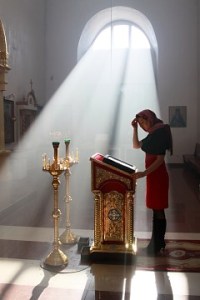by Fr. Patrick Henry Reardon
 If the true identity of Christ our Lord, his inner Person begotten of the Father, remains a mystery concealed from the world (John 14:22), something similar is also said rightly of those who put their hope in Christ, because they too are defined by their communion with the Father in Christ.
If the true identity of Christ our Lord, his inner Person begotten of the Father, remains a mystery concealed from the world (John 14:22), something similar is also said rightly of those who put their hope in Christ, because they too are defined by their communion with the Father in Christ.
They are known by God (John 10:14; 1 Corinthians 8:3; 13:12).
To be sure, the world is able to look at Christians and label them for social and demographic purposes (Acts 11:26), but it does not really know them.
“You died,” wrote Paul to the Colossians, “and your life is hidden with Christ in God” (3:3).
These Christians, whom the world can outwardly distinguish by remarking on peculiar cultural and social patterns, carry about in their lives, amid circumstances however humble, the only force available to mankind for the redemption and transformation of its history. On this earth the treasure of God is veiled and borne about in earthen vessels (2 Corinthians 4:7). Like the clay pitchers of Gideon, the disciples of Christ convey the secret flame that must, in the end, force flight upon the Midianite.
Consequently, the coming of Christ at the end of time will reveal to the world, not only his own glory, but the glory of those who have hoped in him:
“When Christ who is our life appears, then you also will appear with Him in glory” (Colossians 3:4).
Until that day when the inner meaning of history is manifest, it stays concealed except to the eyes of faith.
“Beloved,” wrote the Apostle John, “now we are children of God; and it has not yet been revealed what we shall be, but we know that when he is revealed, we shall be like him, for we shall see him as he is” (First John 3:2).
For Christians themselves, this truth implies practical applications of piety and a disciplined life. Both in John’s First Epistle and in Paul’s Letter to the Colossians, the Christian hope of the final revelation of the believer leads promptly to the theme of holiness and personal purification. The Apostle John, immediately after the verse just cited, went on to say,
“And everyone who has this hope in him purifies himself, just as he is pure” (3:3).
Likewise the Apostle Paul, right after telling the Colossians that their hidden life in Christ will be revealed at his coming, exhorted those Christians to radical and strenuous moral and ascetical effort:
“Therefore put to death your members that are on the earth: fornication, uncleanness, passion, evil desire, and covetousness, which is idolatry” (3:5).
While they await the final revelation of glory, Christians quietly labor in the inner pursuit of that “holiness, without which no one will see the Lord” (Hebrews 12:14).
This characteristic of “concealment” that marks the lives of Christians explains why the Church for many centuries has celebrated an annual Feast of All Saints. Quite simply there are more saints than even the Church can identify, because the inner holiness of most Christians is concealed even from the scrutiny of the Church. For example, we know that there were “many other women” (heterai pollai) who served and provided for Jesus “from their substance,” but only three of those women are named. And even of those three, we know nearly nothing (Luke 8:2-3).
Likewise, there were about one-hundred and twenty Christians waiting for the coming of the Holy Spirit on the morning of Pentecost (Acts 1:15), but the Church herself preserved hardly more than a tithe of their names (1:13-14). Who were those unnamed believers on whom the Holy Spirit fell in the home of Cornelius (10:24,44)? And who were those widows that wept around the body of Dorcas (9:39)? The Church remembered Antipas as the first Christian martyr at Pergamos (Revelation 2:13), but who were those other early Christians at Smyrna and Philadelphia who suffered the same fate (2:10; The Martyrdom of Polycarp 19.1)?
Thus has it always been. The great majority of the saints have lived very hidden lives, their inner communion with God so quiet and concealed that only God knew it. Even those saints recognized by the Church in their own generation were often enough recognized for some trait distinct from personal holiness, such as preaching, pastoral ministry, or theological writings. Although all the saints lived in great loyalty to God, the overwhelming majority of them are beyond our ability to name.
No matter. The Good Shepherd discerns who they are and calls them by name.
